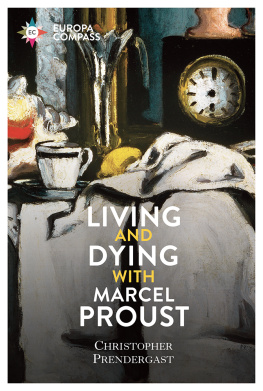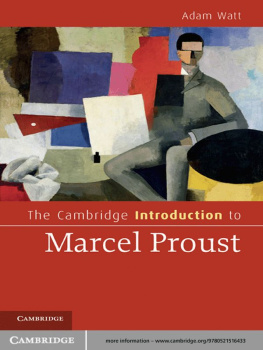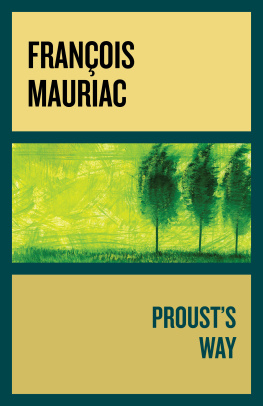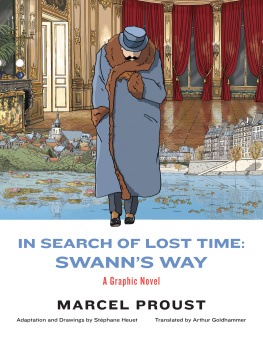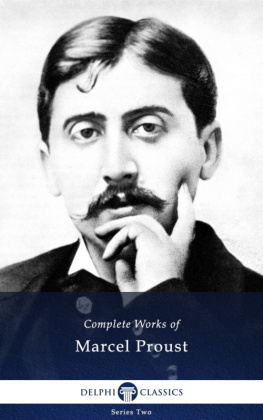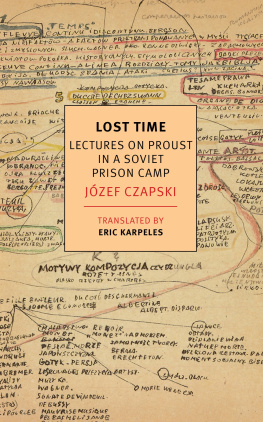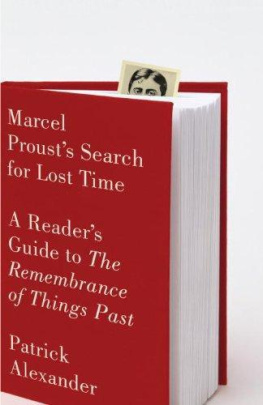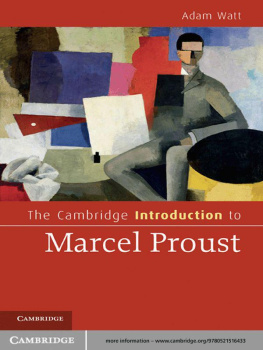Contents
Guide

The author and publisher have provided this e-book to you for your personal use only. You may not make this e-book publicly available in any way. Copyright infringement is against the law. If you believe the copy of this e-book you are reading infringes on the authors copyright, please notify the publisher at: us.macmillanusa.com/piracy.
For Alastair, Theodore, Hugo and Fergus
Happiness is beneficial for the body, but it is grief that develops the powers of the mind.
Marcel Proust, Remembrance of Things Past , Time Regained
Let us be grateful to people who make us happy, they are the charming gardeners who make our souls blossom.
Marcel Proust, Regrets, Reveries, Changing Skies, Pleasures and Regrets
While studying French at university in Edinburgh, I wanted to write my final thesis on Proust. An old uncle whose humour I respected said, It killed Proust to write it, it killed CK to translate it; itll probably kill you to read it I took his advice and settled for Balzac. The CK to whom he referred was my mothers great-uncle, always known by his initials, as there were a number of Charleses in the family.
I grew up with stories of CK. He was my great-aunt Dorothys godfather and she would explain with a grave and sad expression, He was a chomosecshooal, you know. In a framed box on the wall in her drawing room she carefully kept his war medals: a Military Cross, the 191415 Star, the British War Medal and the Victory Medal, which was the handsomest of all, with a rainbow ribbon and a gold winged figure of Victory. She showed me a fragment of red and yellow stained glass picked up from the ruins of Ypres Cathedral, also a ring made by a French officer out of a shell case. My mother, Lesley Scott Moncrieff, told me that as a child she had slept in an attic beside a dark portrait of Charles with a rip in the canvas, which was later mended and given to the National Portrait Gallery in Edinburgh.
Years later, I was given a battered leather suitcase containing the forgotten letters, diaries, and notebooks of Charles Scott Moncrieff; and I settled down to read his translation of Proust. The general editor of the new translation of Prousts great novel reckons it is now beyond the capability of one single person to translate Proust. The 2002 edition took seven translators seven years. Scott Moncrieff spent eight years from 1921 to 1929 working on this by himself, while also translating Stendhal, Pirandello, The Letters of Abelard and Heloise , as well as handling huge amounts of journalism and correspondence. So inspired was his translation that some critics felt he was improving on the original. Joseph Conrad wrote to him in 1922:
I was much more interested and fascinated by your rendering than by Prousts creation. One has revealed to me something and there is no revelation in the other [You have] a supreme faculty akin to genius
The Scott Moncrieff translation is widely seen as a literary masterpiece in its own right, and he is considered one of the great translators into English of the twentieth century. But there was more to him than the translating genius Conrad discerned. An influential player on the English literary scene, he was a man of contradictions: a dedicated and decorated soldier as well as a poet; an ardent Catholic convert and a lover of men. He explored many of these paradoxes in his own poems, of which he said, I am not a good poet and fortunately, I know it. They are mixed in quality, but are a great insight into his character, and as they are generally unavailable, I have put together all of the poems in my possession, both published and unpublished, in a separate book.
He was not only a man of letters; his war record was outstanding, his attitude to war unusual. His many letters from the front were appreciative and entertaining. Here was a very sensitive, highly intelligent, active poet, who drew enjoyment from being a soldier. His letters threw new light on my view of that time of slaughter.
He was a splendid letter-writer with an habitually irreverent turn of mind. He revealed a complex soul and a dry wit; especially in letters in the Berg Collection in New York Public Library, written to Edward Marsh, civil servant and patron of poets. Charles met him late in life not long before moving to Italy which was an easier climate for his wounds and cheaper on his pocket. There was also an expat colony of English writers. The young Evelyn Waugh wrote to him there in 1923, hoping to become his secretary because he was known by then as a critic and controversial man of letters who had loved Wilfred Owen, was hated by Osbert Sitwell, idealised by Nol Coward, cold-shouldered by Siegfried Sassoon, admired by Joseph Conrad and sniped at by D. H. Lawrence. Waugh dreamt he would spend his time, drinking Chianti under olive trees and listening to discussions of all the most iniquitous outcasts of Europe. However, Charles could not have a secretary who was not privy to his second double life; that of an intelligence agent. When he finally did get one, she also worked in intelligence.
The Society of Authors still awards the annual Scott Moncrieff Prize for translation from French. Conscious of his task of selling Proust to the English-speaking world, he did not make an exact literal translation but a poetic one one he knew would appeal to the post-Edwardian public and one that has been the subject of appreciation and controversy ever since.
My research and writing have been a great adventure which took me to the battlefields of Flanders and Picardie; to Florence, Pisa and Rome, staying in the same hotels that Charles did, and finding his exact flat in 67, Via della Croce, Rome, to rent. One autumn I travelled round the Italian Riviera, carrying my baby sons pram up and down the same steps where Charles had limped in the railway stations in the 1920s. He had used the London Library, and so did I; and there, at the foot of the stairs, is a bronze bust of Edmund Gosse, emanating the effortless self-confidence that made me understand his fatherly but cavalier attitude to Charles.
The most startling discovery was that Charles had also been an intelligence agent for the British in Mussolinis Italy. He had learnt early on how to live parallel lives, both of them sincere and believable: the Charles at home, religious, loving and dutiful, as well as the young blood among the homosexual coterie with Robert Ross and his friends in London. The lives did not overlap, nor come into conflict, he just stepped from one parallel to the other. This natural subterfuge made it easy for him to become a spy. (Perhaps a reason so many homosexuals were successful spies.) In fact he enjoyed the sophistication. There is also a connection here to his translating. He translated a work much as an actor took on a character, jumping into someone elses skin and walking around in it. It became effortless; leaving behind one aspect of his character and taking on another.
* * *
The role of translator normally requires obedience, almost a shadowy role as a medium for another great mind, but Charles was determined to have the same size of ego as that of any creative writer. No other translator prefaced their works with dedicatory poems to their friends. Likewise his profile in the media thanks to critics like Edmund Gosse was as high as any creative writer. His was an interpretation of a great work, like Casals interpreting Bach, or Olivier enacting Shakespeare. He was compared to Richard Burton, whose translation of the Arabian Nights was bold and imaginary, inventing his own vocabulary if necessary.
Having spent the flower of his youth on the war, he felt that he was chasing lost time for the last ten years of his life. This feeling of being hounded by time led to a frenetic work schedule, and him publishing nineteen volumes of difficult translation, writing thousands of letters and neglecting his physical health. It is unlikely he ever cooked himself a meal, relying on black coffee and wine by day and dining out at night where he was celebrated as a first-rate entertainer by his friends. Proust wrote a slow exploration in search of lost time, but Charles was actively chasing time, he was a man never at rest; constantly making unnatural demands on himself, leading an action-packed life. Fuelled by his high ideals:


